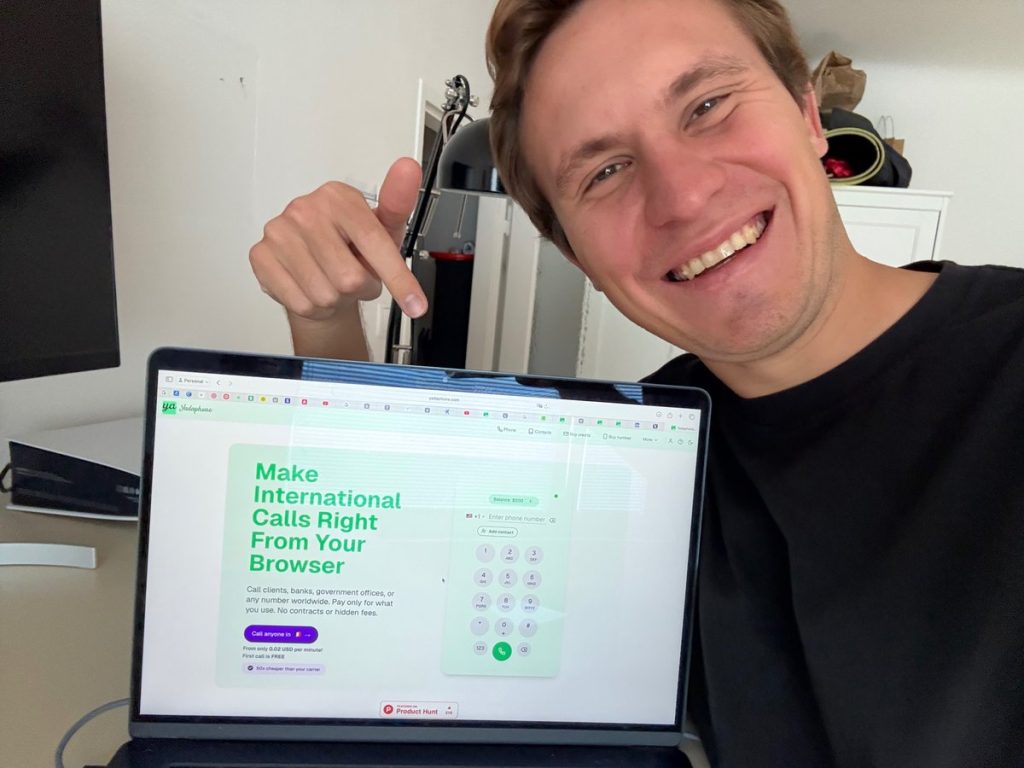Every few months, someone pops up on the internet claiming to have built an app that “took off overnight”. Most of these claims quietly dissolve after a few weeks when the Stripe balance returns to zero. But occasionally, one sticks, and that’s what happened with Yadaphone, an international calling app built by Dennis Yurchak, a self-taught developer who turned a small technical curiosity into a steady $14,000 a month business.
Dennis wasn’t a typical founder. He didn’t come from Silicon Valley or leave a FAANG job with a stack of RSUs. In fact, he started out working in diplomacy before teaching himself to code. Two months later, he’d built Yadaphone, an idea born partly out of frustration and partly out of timing.
I shipped the MVP in a weekend and launched it on Reddit and X. I launched products before, but none made money. This time was different – I saw the first Stripe notification minutes after I announced Yadaphone on Reddit.
when Microsoft announced it wanted to close Skype down, a lot of people were angry. I saw a tweet by Pieter Levels (@levelsio), saying how pissed he was and inviting people to build an alternative. I thought, hell, I can build it.
Thomas Merton
When Microsoft quietly put the final nail in Skype’s consumer-friendly coffin, the internet lost one of its cheapest ways to call actual phone numbers abroad. For most of us, this was mildly inconvenient but for Dennis, it was a business opportunity. He saw a market gap and decided to rebuild the one feature he missed most, cheap international calling, and nothing else.
The Product That Shouldn’t Have Worked
In theory, Yadaphone shouldn’t have worked. The market is dominated by giants like WhatsApp, Viber, Google Voice. But Dennis kept it ruthlessly simple, a browser based pay-as-you-go calling app with a minimal interface and no subscriptions, you add credits, make a call, and that’s it.
That simplicity turned out to be the selling point and travellers, freelancers, and small businesses found Yadaphone a refreshing alternative to bloated apps that required logins, upgrades, and endless “premium plans”. In an age where every company wants recurring revenue
There was no marketing budget, no PR agency, and no influencer campaign. Dennis launched Yadaphone on Reddit and Product Hunt, posting about what he’d built and what he’d learned. He was banned a few times for over-sharing his own links, but persistence (and probably curiosity from Redditors tired of being sold to by AI bros) paid off.
Then, just as a tweet had started the idea, a retweet from Pieter Levels propelled it further. That single tweet sent 200,000 people to his site and turned what had been a weekend project into a functioning business. From there, Yadaphone grew organically, powered mostly by word-of-mouth and the occasional mention in developer forums.
Building Without a Team
Dennis built the entire thing himself using React, Next.js, and Supabase, hosted it on Vercel and handled payments through Stripe. The voice functionality relies on existing VoIP APIs rather than reinventing the wheel and there’s something quietly impressive about the simplicity of it.
He didn’t try to “disrupt telecoms” or raise a pre-seed round. He just used the modern web stack for what it’s best at, getting a simple idea live, fast.
Within a few months, he had 10,000 users and $14,000 a month in recurring revenue. No office, no employees, just a one-man operation run from a laptop.

The SEO That Nearly Broke Him
Like most solo founders, Dennis learned SEO the hard way. At one point, a small error in the site’s configuration tanked his search traffic overnight and tat’s when he realised that SEO isn’t a quick fix, it’s a long game of slow gains and occasional heartbreak.
He rebuilt his content strategy from scratch, publishing guides like How to Make International Calls from Japan and targeting long-tail queries that the bigger players ignored. Over time, it worked. Yadaphone started ranking organically, bringing in a steady flow of new users without paying for ads.
Dennis had a clever approach to SEO that went beyond just keywords and blog posts. He started contacting authors and website owners who still mentioned Skype in their articles, politely pointing out that Microsoft had shut it down and suggesting they replace those links with Yadaphone instead. It was a nice trade, they got to keep their content relevant, and he got backlinks from credible sites, so most said yes. That small act of outreach helped Yadaphone start ranking for notoriously difficult search terms like “Skype alternative”, a feat that would normally take months of agency work and a lot more caffeine.
To widen the reach, Dennis went after local newspapers and startup magazines, using the same strategy. Small publications are always looking for new stories, and “solo founder builds a working Skype replacement” practically writes itself. One of those outlets ended up interviewing him, which brought a wave of publicity, a credibility boost, and a backlink worth its weight in gold. His takeaway was simple but sharp: if you want coverage, don’t shout into the void. Look for journalists who’ve written about startups like yours before, reach out directly, and give them a story they’ll actually want to tell.
From $0 to $14,000 a Month, and Still Solo
Today, Yadaphone makes around $14,000 a month. It’s not a unicorn, but that’s sort of the point, it’s a lean, profitable, one-person startup built on practical tech and patience.
Dennis hasn’t quit or pivoted into crypto, he’s quietly growing his product, adding new features, and keeping his overheads at zero. It’s a reminder that not every startup needs a flashy pitch deck or a seed round, sometimes, it just needs to work. A self-taught developer spotted a gap, built a tool he needed, priced it simply, and told people about it, and the rest followed.
If anything, it proves that the best tech ideas don’t need to sound revolutionary to be successful. Sometimes, all they need is timing, good code, and a founder stubborn enough to keep showing up after Reddit bans him three times.






